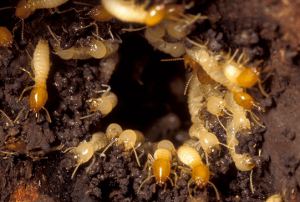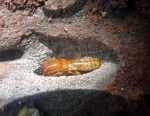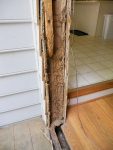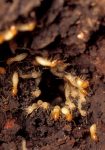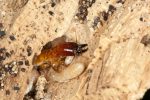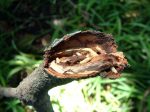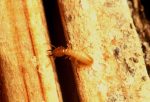Termite Control Houston 
Termites are insidious creatures, working silently behind the scenes in droves. They’re tough to spot with the untrained eye, and can cause thousands of dollars’ worth of damage before you even realize you have a problem. Termites are responsible for $5 billion in property damage every year, which is not surprising when you look at the size of their colonies.
The average termite colony contains 3 million members, although there have been several documented cases of colonies reaching more than 70 million termites in size. Despite the worker termite’s incredibly small stature that typically measures one centimeter or less in length, their feeding habits are enormous.
Termites have been known to cause much more extensive damage in homes and businesses than they do in nature, making termite inspection important on a regular basis and termite extermination imperative at the first signs of trouble.
Identifying Termite Types
While termite swarmers and ant swarmers appear similar, termites are a totally different insect species with a history that stretches back 150 million years. Houston is home to three different termite types notorious for feasting on area residential and commercial buildings.
Subterranean Termites
Subterranean termites normally swarm in March and April in the Houston area, when temperatures start heating up to at least 70 degrees. Although they primarily live underground, they can live aboveground if they find a protected location that provides the moisture they need to survive. Cellulose is another item they require for survival, which is why they feed on paper, wood and other products that contain it.
Formosan Termites
Known as the “super termite” due to their highly aggressive and destructive habits, Formosan termites are a specific species of subterranean termites. A mature Formosan colony can cause massive damage in a rapid amount of time, with reports indicating a single Formosan colony could destroy an entire wooden structure in about 90 days.
In addition to wood and similar products, Formosan termites have been known to attack more than 50 plant species as well as non-cellulose products in their quest for new food sources and moisture. Those products have included plastic, rubber, mortar, asphalt, creosote and even soft metals.
Drywood Termites
Unlike their subterranean counterparts, drywood termites do not need a high moisture content to survive. They also tend to swarm a bit later in the year. Wood with low moisture content is their food of choice, steering clear of moist or decaying wood products. They attack various types of wood products, from structures to furniture. Their damage is only less intense than subterranean termites because the species is not as widespread.
Warning Signs You Have Termites
Several warning signs can alert you it’s time for termite treatments, although termite infestations may only be revealed through a thorough termite inspection. Visible signs to look for include:
Small mud tubes: Termites usually enter Houston homes and businesses from the perimeter of the structure, often building up mud tubes that let them enter through cracks, weep holes or other openings.
Evidence of destruction: Crumbling drywall, sagging doors or floors and small holes in wood are some of the more obvious signs of a termite infestation.
Evidence of residence: Insect wings can also indicate termites swarming termites have found a home in your home.
Sources of moisture: Since subterranean termites need moisture to survive, you want to pay attention to leaky pipes, standing water and damp conditions. Keep in mind that termites can also enter the home or business through shower drains, toilet drains, bath traps and other plumbing structures.
Treatment of Termites
Effective termite treatment depends on your individual termite situation, and Cypress Creek Pest Control uses a flexible application approach we align with the size, scope and termite type of infestation.
Our termite treatment secret weapon is an advanced, non-repellent liquid termiticide. The insecticide’s non-repellent nature means termites can’t detect its presence and avoid it. They instead contact, ingest and spread the termiticide throughout the entire colony, ensuring total colony elimination and guaranteeing the protection of your home or office.
How Often Should You Have a Termite Inspection?
At the very least, residential and commercial properties should undergo a termite inspection at least once a year. Houston home owners can play it even safer with a quarterly termite inspection that checks for sign of damage or infestation four times a year. If you notice signs of damage or infestation prior to a scheduled termite inspection, don’t wait. Call immediately for termite extermination services.
“Cypress Creek honored their warranty, came out again and found the true issue! Trust these guys, they work to get to the bottom of sometimes complicated issues like ours… Now we can sleep again!”
How You Can Prevent Future Termite Invasions
Regularly scheduled termite inspections are an important component in helping to keep termites under control. Houston home and business owners can also embark on several measures designed to prevent future termite invasions. These include:
- Eliminating moisture sources, such as water collecting around a structure’s foundation from downspouts, gutters, or accumulation of groundwater
- Repairing leaky pipes and openings surrounding them
- Properly ventilating basements and other damp areas inviting for termites
- Removing readily accessible food sources near the perimeter of the home, including wood piles, wood mulch, dead trees, stumps, roots and debris
- Regularly checking wooden decks, wooden fences and other wooden object for termite damage
- Keeping all wooden parts of the structure foundation 6 to 18 inches above the soil, using concrete or steel steps, supports and other implements directly touching the soil
Although termite damage can be some of the most destructive, termite treatments can be highly efficient and effective when done by experienced termite extermination professionals. Cypress Creek Pest Control offers that experience and professionalism, along with a termite warranty that ensures our methods work.

